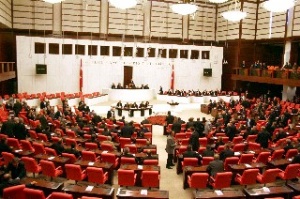
Turkey's parliament on Thursday approved a major constitutional amendment to allow the president to be elected directly by voters, a move that could fan fresh tensions between the Islamist-rooted government and secularists.
However, the amendment, backed by more than two-thirds of MPs in the 550-seat assembly, must be signed by President Ahmet Necdet Sezer to become law. Sezer, often at odds with the government, has signaled he might veto the law.
The reform envisages Turkey's president being elected for a five-year term, renewable for a further five years. Parliament now elects the president for a non-renewable seven-year period.
The ruling center-right AK Party decided to push the reform in a direct appeal to voters after losing a battle with Turkey's secular elite, which includes army generals and top judges, to get its presidential candidate, Foreign Minister Abdullah Gul, elected in parliament, analysts say.
"The AK Party did not have much choice after Gul was blocked, but they (army) may see this as a counterattack," said academic and Middle East expert Cengiz Candar.
"Whether this counterattack will be sustainable is difficult to say. We have to wait and see what the actions of the hardline secularists will be," he added.
Parliament has now postponed the presidential contest until after a July 22 general election. Sezer will stay in office in an interim capacity until his successor can be chosen.
The political turmoil has unnerved financial markets.
AK has said it may take the presidential election issue to a referendum if Sezer or the courts block it. Opinion polls show strong public support for the reform.
AK says the constitutional reform aims to make Turkey -- a secular but predominantly Muslim country -- more democratic. Critics say they have not been properly thought out and could upset the checks and balances in the constitution.
Critics say Prime Minister Tayyip Erdogan knows the reform is unlikely to be enacted before July's vote, and that he is merely trying to impress voters after opposition parties blocked Gul's election.
In Turkey's parliamentary democracy, the government holds most power. The president has key veto and appointment powers and is commander in chief of the armed forces.
Other amendments approved by parliament on Thursday include reducing parliament's term to four years from five.
Lawmakers also approved measures that would make it more difficult for the pro-Kurdish Democratic Society Party (DTP) to field candidates as independents in an effort to circumvent Turkey's high 10 percent threshold for entering parliament.
AK is worried about losing seats to DTP in Turkey's mainly Kurdish southeast region. Mainstream parties also accuse DTP of having close links with Kurdish separatist rebels. DTP says it rejects violence and favors change only by democratic means.
An opinion poll published in the weekly Tempo magazine on Thursday suggested support for AK, which has presided over strong economic growth and the launch of European Union entry talks, has increased after its latest spat with secularists.
The A&G poll showed support for AK at 41.3 percent, up from 34 percent in the 2002 election and above another recent poll that gave the party just 29 percent. The main opposition party, CHP, would win just 14 percent, according to A&G.
The survey showed Turks almost evenly split over whether the powerful army General Staff was right to intervene in the recent crisis with a statement making clear it opposed Gul's candidacy. The EU strongly condemned the army intervention as undemocratic.
The army, which views itself as the ultimate guarantor of Turkey's secular system, has ousted four cabinets in 50 years.














